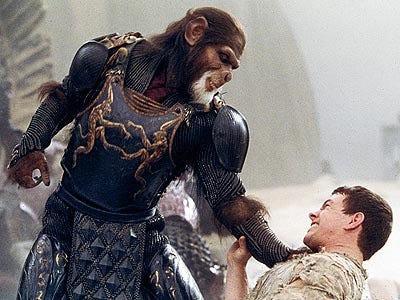The Burton Binge: "Planet of the Apes"
Each Sunday with “The Burton Binge,” Sam Watermeier will look back at one of Tim Burton’s films, ultimately tracing the return to the auteur’s roots with the October 5 release of “Frankenweenie,” an animated adaptation of Burton’s first live-action short film.

It’s easy to see what would draw Tim Burton to “Planet of the Apes.” Like his other films, it’s about a stranger in a strange land. What’s harder to understand is how he managed to do nothing remotely interesting with it.
How did the director behind the subversive “Batman” and “Batman Returns” produce such a blandly bad blockbuster spectacle?
Right from the beginning, Burton’s stamp is nowhere to be found. The film opens in a sterile, symmetrical spaceship with cocky astronaut Leo Davidson (Mark Wahlberg) teasing his simian co-worker during a flight simulation.
Leo makes the little chimp painfully aware that he is the lesser between the two of them. But Leo soon finds himself in that position when he crash-lands on the titular planet where humans are slaves.
The introduction of the planet is somewhat intriguing — and a slight change of direction for Burton. While his other films focus largely on tortured outcasts disrupting “normal” worlds, this one finds a straight arrow among beasts. And boy, are they beastly! Tim Roth delivers a particularly overwrought performance as an evil chimp leader, constantly snarling and speaking in a strained voice as if he were constipated. But of course, there is the sensitive ape (played nicely by Helena Bonham Carter).
The film has only one striking “Burton moment,” and it involves an ape buying a toddler girl as a pet. It’s easily his most disturbing funhouse depiction of the treatment of an outsider. It’s also a surprisingly mature scene. While Burton could have easily made the moment surreal and darkly humorous, it remains grim and sad.
While Burton may seem like a perfect fit for this story of outsiders, he does nothing to make it his own. The film doesn’t even look like a Burton movie. He seems to be an outsider to its world. The major appeal of his films is the extent to which his presence is felt in them, but it's nowhere to be found here.
What’s even more frustrating is the fact that the movie is dull. I wouldn’t be so disappointed by its lack of visual flourishes if it weren’t such a sluggish bore.
This project has entertaining source material, a solid cast and a visionary directory behind it. What on earth went wrong?
Fortunately, Burton followed this disaster with a far more personal film, and arguably his best work since “Edward Scissorhands.” Stay tuned, as I will discuss “Big Fish” next time.


